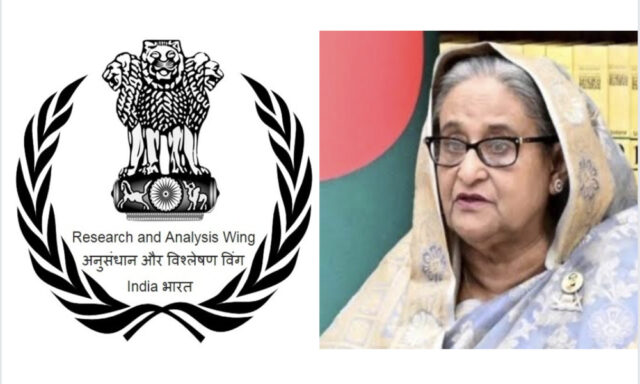– By Uttam Guha from Delhi
Among foreign missions, the Bangladesh mission is currently the most crucial for India. Maintaining control over Bangladesh is vital for India’s geopolitical security. Losing this control is a significant concern for India. Over the past decade and a half, ‘RAW’ (Research and Analysis Wing) faced major challenges including the BDR rebellion and ensuring an Awami League victory in the 2014 elections. ‘RAW’ successfully navigated these challenges and also managed to keep the Awami League in power in 2024.
According to diplomatic sources in Delhi, following the announcement of the U.S. visa policy in May 2023, Sheikh Hasina and her sister Sheikh Rehana held extensive meetings with the then-chief of ‘RAW’ and two former High Commissioners to Bangladesh during her visit to the Maldives. The plan to manage the United States was formulated during these meetings. ‘RAW’ successfully executed this plan, and both Sheikh Hasina and ‘RAW’ were confident post the January 7 election.
During Sheikh Hasina’s recent visit to Delhi, she signed three agreements with India as a token of gratitude for ‘RAW’s’ assistance. Opposition parties in Bangladesh claim these agreements heavily favor India. The agreements include granting India control and management of the Mongla port, establishing a railway corridor through Bangladesh to Assam and Tripura, and the Teesta River project. Although the Mongla and railway corridor agreements proceeded, the Teesta project was delayed due to certain strategic postponements by Bangladeshi officials.
Sources among Bangladeshi officials reveal that the railway corridor agreement file is not in the Bangladesh High Commission in Delhi or the Railway Ministry but with Prime Minister Sheikh Hasina. One clause of the agreement states that Bangladesh will not have the right to inspect or know what India transports through the railway. However, if Indian railways face any security issues within Bangladesh, the Bangladeshi security forces will assist Indian security forces. This provision effectively allows Indian troops to enter Bangladesh under the pretext of protecting their railway operations.
After these agreements were exposed, China expressed displeasure with Sheikh Hasina. China suspects that the railway corridor will be used to transport military equipment to counter China in India’s northeastern region. Consequently, Sheikh Hasina’s visit to China did not yield the expected success, with China displaying a noticeably cold attitude.
While ‘RAW’s’ central headquarters in Delhi was meticulously analyzing Sheikh Hasina’s China visit, students in Dhaka took to the streets over the quota movement. A young Bengali ‘RAW’ officer was assigned to monitor this movement closely.
On receiving information from this officer on July 17, senior ‘RAW’ officials were alarmed. Reports in Delhi indicated that the Dhaka police high command had ordered the shooting of general students. Initially believed to be the actions of former Inspector General of Police Benazir Ahmed’s followers, it was later discovered that the orders came from higher government levels with derogatory remarks. Despite police efforts to suppress the situation through shootings, control was lost within 24 hours. On July 18, both governments were in a state of panic. Saima Wazed Putul, Sheikh Hasina’s daughter, communicated with several Indian diplomats in Delhi, describing the situation as more severe than the BDR rebellion, stating, “Our student has rebelled.”
Following this, Sheikh Hasina had a direct phone conversation with the head of ‘RAW’, discussing the imposition of a curfew and communicating that Jamaat Shibir would infiltrate the movement after Friday prayers. ‘RAW’ advised imposing a curfew and promised to send a team promptly. While Sheikh Hasina agreed to the curfew, she sought internal military details from DGFI. However, ‘RAW’ assured her regarding the military’s stance before DGFI could respond. Notably, after the 2009 BDR rebellion, a segment of DGFI has essentially become a cell for ‘RAW’ in Bangladesh, supplying all military information to India and influencing the Bangladeshi military in various matters, including arms purchases.
Both ‘RAW’ and Sheikh Hasina believed that imposing a curfew and shutting down the internet would bring the situation under control. However, on Saturday, despite the curfew, people took to the streets in Dhaka, resulting in the deaths of around fifty people. ‘RAW’ also discovered that a faction of the Awami League silently supported the movement.
In response, Indian policymakers held multiple meetings in Delhi and Kolkata on Saturday, consulting journalists monitoring Bangladesh and the two Indian diplomats who attended the Maldives meeting. Some concluded that Sheikh Hasina’s days were numbered, but amidst this, the ‘RAW’ chief sent a message, “Use Kashmir’s experience in the East. If necessary, create another Kashmir in the East but keep Sheikh Hasina in power.”
Upon receiving the directive, a ‘RAW’ team landed at Tejgaon airport in Dhaka on Saturday. The team immediately met with DGFI, DB police, and other intelligence officials, closely monitoring the U.S. and Chinese embassies.
The decision was made to replicate the 2019 Kashmir suppression strategy to ensure the success of the 2024 Dhaka mission. Control over all phone communications was established. Junior army officers were closely monitored, and a team for disappearing bodies was formed. Joint forces began house-to-house searches similar to those conducted in Kashmir.
‘RAW’ officials directly observed the situation in Dhaka, leading to various anti-India rumors, including reports of people speaking Hindi with security forces. Following court rulings and government notifications, Sheikh Hasina regained control. Consequently, on July 24, Delhi ordered ‘RAW’ personnel to cease field operations, and the team withdrew on July 25, with a support team providing advice from Delhi.
Additionally, measures were taken to prevent any anti-Bangladesh protests in Delhi and Kolkata. The Bangladesh High Commission appointed an officer to oversee this matter. After leftist student organizations in Kolkata besieged the Bangladeshi Deputy High Commission, the High Commission in Delhi came under pressure.
On Sunday, July 21, a professor from Jawaharlal Nehru University’s South Asian Studies was invited for lunch at the Bangladesh High Commission in Delhi. During this lunch, the professor was tasked with ensuring that leftist organizations at the university did not stage any protests or besiege the High Commission in Delhi.
Source: https://bangla.themirrorasia.net/news/2024/07/30/2577










